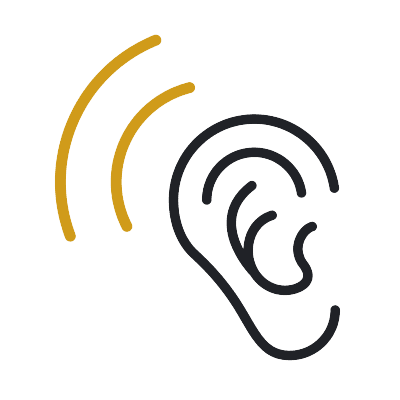Create a great study space for online learning
This guide covers:
- study space essentials
- useful study space furniture and gadgets
- correct posture for studying at a desk
- effective study space tips
- study space ideas away from home.
Online distance learning means you can study wherever you can connect to the internet. But the best place to get some serious work done is in a dedicated study space.
Study space essentials
Our online students tell us one of the most important things to get right is study environment.
You need a space that’s optimised for concentration, comfort and results.
What your space looks like is up to you. But try to make sure it has:
- plenty of light – natural light if you can
- a table-top-height desk and seat that’s comfortable
- any ergonomic equipment that you might need
- a plug socket nearby if you need it.
Lighting
Make sure the space you study at has enough light. Too little can lead to eye strain and make you feel tired.
Natural light has a positive impact on your mood, so if you can set yourself up by a window, or direct more natural light in with a mirror, all the better.
Reducing eye strain at your computer
If you’re often working on your computer after the sun goes down, try f.lux. It’s a piece of free software that automatically warms the colour temperature of your display as sunlight fades, reducing eye strain. Find out about f.lux.

Study space furniture
You want to be comfortable, but not so comfortable that you fall asleep. Studying in bed or on the sofa is not always the best option.
Start with a desk or table
Choose a desk or table that comes up to between your waist and ribcage when you sit at it, and a chair that fits the height of the desk. You want to be able to rest your feet on the floor, and not have to hunch your shoulders over your desk or table when working. Sitting upright helps to keep you alert.
How to create a study space without a desk
If a traditional desk will not work in your space, try these alternatives:
- Wall-mounted desk. Folding wall desks are available too, folding up when not in use to save space.
- Portable folding table that you can set up as and when you want to study.
- Standing desk.
- Laptop tray.

Correct posture for studying at a desk
For parts of your studies, you may be sitting in one place for hours. So, it’s essential for your health that you have a comfortable chair to sit in and that you check your posture. Check your posture with the Health and Safety Executive’s posture guide.
- Screen at eye level.
- Feet firmly on the floor, or on a footrest.
- Forearms parallel to floor.
- Wrists in a straight, neutral position.
Study space accessories that can help you get comfortable
- Footrest.
- External keyboard and mouse. More ergonomic than using your laptop keys and trackpad.
- Wrist rest. Some students like to use a wrist rest to keep wrists straight and at the same level as their keyboard.
- Laptop riser or laptop stand, to raise the level of your screen.
Ergonomic equipment needs
If you have additional ergonomic workstation requirements for health or disability-related reasons, and you are experiencing financial hardship, you may be able to apply for financial assistance for ergonomic equipment.
Effective study space tips

Sight
Remove visual distractions, including your mobile if you can. Clear any clutter and have a bit of a tidy before you start studying. This will help your mind focus on your task.
Useful accessories:
- Pinboard.
- Folders.
- Desk tidy.

Sound
A noisy environment can be distracting. If you can, try to study in a room with a door so you can shut out the world better. Invest in a pair of comfortable headphones to help you block out sound when you really need to concentrate.
The right sounds can also help you study. Some online students find perfect silence just does not work for them. You may be the kind of person who enjoys a little background noise when studying.

Useful apps and accessories
- Headphones. Active noise-cancelling headphones can help block out background noise.
- Noisli. A clever online noise generator to help you relax and focus in noisy environments.
- Spotify and YouTube playlists, like Chill Beats Music and Jazz for Work and Study.
- If music distracts you, simple white noise can block out distracting background sounds.

Temperature
It can be difficult to concentrate when studying in a stuffy room. Fresh air can help you stay alert. Try and work somewhere that’s well ventilated, or where you can open a window.

Dedicated space
Whenever possible, you should only use your study space for studying. Keeping it a designated study area will help you switch into study mode whenever you sit down there. This effect will fade if you start using the same area for web browsing, eating, chatting on the phone.
Take regular breaks from your study space, no matter how inviting you’ve made it, to feel properly refreshed between study sessions.
Study space ideas away from home
Our online students have shown us there’s no one-size-fits-all when it comes to study space. Rooftops, planes, army barracks – they’re constantly surprising us with their study locations and dedication.
When studying at home is not an option, here are some alternatives to try.
- On-campus libraries – did you know you have access to our on-campus libraries? All our online students are welcome to use our library facilities. See our latest library opening hours.
- University libraries across the UK and Ireland – through the SCONUL Access scheme, you have access to books, journals, resources and quiet study spaces at over 150 university libraries across the UK and Ireland. Find out how to access your local university libraries.
- Walking, commuting, your local park – lots of our online courses feature podcasts, audio lectures, and sound clips so you can study on the go.
- Your workplace.
- Cafés and coffee shops.


